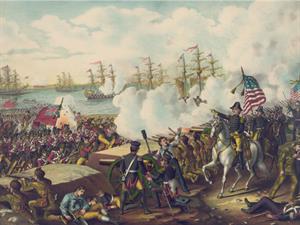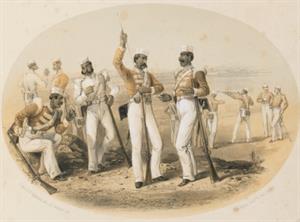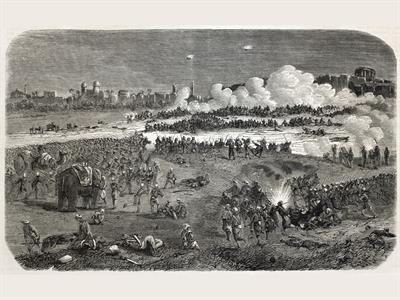
PUMPA - SMART LEARNING
எங்கள் ஆசிரியர்களுடன் 1-ஆன்-1 ஆலோசனை நேரத்தைப் பெறுங்கள். டாப்பர் ஆவதற்கு நாங்கள் பயிற்சி அளிப்போம்
Book Free Demo7. The Sparks (1855-57)
(Scene 1: A terrific war)
Narrator: Taxes continued to ruin the peasants. In Bengal, the Santhals who had lost their lands under new land rules, became desperate. In 1855, they rose in rebellion and massacred Europeans and their supporters alike.
(Scene 2: Soldiers can be seen talking to each other)
Narrator: Discontent was brewing in the East India Company’s army too.
Soldier 1: The white soldier gets huge pay, mansions to live in, servants.
Soldier 2: While we get a pittance and slow promotions!
Soldier 3 & 4: The Angrez asks us to cross the sea which is against our religion. Who is the topiwala to abolish our age-old customs?
Sepoy Mangal Pande (to himself): We must drive out the Angrez.
Narrator: Sepoy Mangal Pande attacked the adjutant of his regiment and was executed.
(Scene 3: Sepoys revolted against the Europeans)
Narrator: Thousands of other sepoys revolted. They were stripped of their uniforms, humiliated and put in irons.
(Scene 4: Three men can be seen having conversation with each other)
Narrator: Few Englishmen had care to understand Indian customs or the people’s mind.
Indian man: Oh, proud Brahmin soldiers, do you know that the grease on the bullet you have to bite is made from the fat of cows and pigs?
Brahmin soldier: What ?
Muslim man: The white man has deceived us too!
(Scene 5: People were sending chapaties from one village to another village)
Narrator: Soon, chapaties were sent from village to village to tell the people that their emperor would want their services.
Man 8: Yes, all my village men will be ready.
(Scene 6: Indian soldiers circulates lotus flowers)
Narrator: Similarly lotus flowers circulated among Indian soldiers.
Soldier 5: Death to the foreigner!
Narrator: The masses gave all help and shelter to the patriots.
Explanation:
The ever-increasing taxes started to destroy the peasants. The increased tax continued to pressure the people and worsen their financial situation. The Santhals in Bengal became worried and hopeless after losing their land to the Britishers under the new land laws. The Santhals are the member of a large indigenous group living mainly in Eastern India. Due to anger, the Santhals protested through a terrific war against the Europeans in 1855. They killed the Europeans and those who supported the Europeans.

A terrific war
The soldiers working under the Britishers were highly dissatisfied because of the Britishers. The reason for hating Britishers was they gave good pay for the Englishmen, big houses to stay, and other help. But for Indians, they offered only less money and slow promotions. The Indian soldiers cannot afford running their family with that income. So they hated the Britishers for showing partiality among people.
The Indian soldier's felt terrible because the people of England urged them to move out from their land to cross the sea and work for them. "Crossing the sea" was considered to be against their religion and as per their religious leaders. So the Indian soldiers were angry with their English leaders. The Indian soldiers argued that who had given the rights to speak about their old customs and traditions.
The Indian soldier's felt terrible because the people of England urged them to move out from their land to cross the sea and work for them. "Crossing the sea" was considered to be against their religion and as per their religious leaders. So the Indian soldiers were angry with their English leaders. The Indian soldiers argued that who had given the rights to speak about their old customs and traditions.

Indian soldiers can be seen having a conversation with each other about the partiality of the Britishers
After hearing that, an Indian soldier serving under British or European orders named Sepoy Mangal Pande thought to himself that he must drive the Britishers out from India. Later on, Mangal Pande attacked the British military forces, and so he was executed (killed). After that, thousands of other sepoys like Mangal Pande took violent action against the Britishers, but the Britishers took away their weapons and uniforms, and they put the sepoys in jail. The reason behind putting the sepoys behind bars was they were fighting against the English men.

Thousands of sepoy were fighting with the Britishers
The Englishmen were least bothered about the thoughts, beliefs and traditions of Indians. An Indian man told a Brahmin soldier that the bullets they were supposed to bite were made from the fats of cows and pigs. The Brahmin soldiers should open the cartridges containing gun powders and they need to fill them in the guns. After hearing that the grease on the bullet was made of the fat of pigs and cows, the Brahmins felt very angry. Because Brahmins are supposed to worship cows. Finally they came to a thought that the English men had betrayed them.
Later on, the Indians planned to defeat the Britishers. So chapaties were being sent to each home in every village, conveying that their services could be required to fight against the Englishmen. The chapati movement involved the unusual distribution of thousands of chapaties across several Indian villages during 1857. It is probably believed that the chapaties were distributed to convey a message of the native emperor seeking help from the nearby region. The ultimate origin of the movement is unknown, though the Britishers believed that the chapaties might contain secret notes or messages to trap them. People agreed that they would support their emperors. Lotus flowers were circulated among the Indian soldiers because it was the national flower of India. The nation stood against the Britishers, and the Indian people gave shelter and adequate help for the patriots. Patriots are the persons who vigorously support their country and prepares to fight against their enemies.
Later on, the Indians planned to defeat the Britishers. So chapaties were being sent to each home in every village, conveying that their services could be required to fight against the Englishmen. The chapati movement involved the unusual distribution of thousands of chapaties across several Indian villages during 1857. It is probably believed that the chapaties were distributed to convey a message of the native emperor seeking help from the nearby region. The ultimate origin of the movement is unknown, though the Britishers believed that the chapaties might contain secret notes or messages to trap them. People agreed that they would support their emperors. Lotus flowers were circulated among the Indian soldiers because it was the national flower of India. The nation stood against the Britishers, and the Indian people gave shelter and adequate help for the patriots. Patriots are the persons who vigorously support their country and prepares to fight against their enemies.
Meanings of the difficult words:
| S.No | Words | Meanings |
1 | Peasant | A poor smallholder or agricultural labourer of low social status |
2 | Santhal | A member of a large indigenous group living mainly in eastern India |
3 | Desperate | Feeling or showing a hopeless sense that a situation is so bad as to be impossible to deal with |
4 | Rebellion | An act of armed resistance to an established government or leader |
5 | Massacred | Deliberately and brutally kill many people |
6 | Discontent | Dissatisfaction with one's circumstances |
7 | Brewing | Of an unwelcome event or situation begin to develop |
8 | Mansion | A large, impressive house |
9 | Pittance | A very small or inadequate amount of money |
10 | Promotions | The action of promoting someone or something to a higher position or rank |
11 | Abolish | Formally put an end to a system, practice, or institution |
12 | Custom | A traditional and widely accepted way of behaving or doing something that is specific to a particular society, place, or time |
13 | Adjutant | A military officer who acts as an administrative assistant to a senior officer |
14 | Executed | Kill someone as a political act |
15 | Revolted | Take violent action against an established government or ruler; rebel |
16 | Grease | A thick oily substance, especially as used as a lubricant |
Reference:
National Council of Educational Research and Training (2008). Honeydew. Glimpses of the Past-S.D.Sawant(pp. 36-49). Published at the Publication Division by the Secretary, National Council of Educational Research and Training, Sri Aurobindo Marg, New Delhi.
https://commons.wikimedia.org/wiki/File:Gruppo_di_Sepoys.jpg